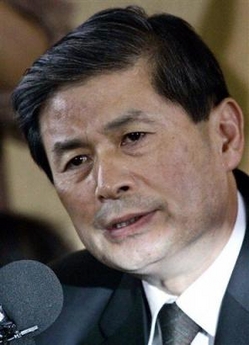|
South Korean cloning pioneer sorry for ethics lapse
(AP)
Updated: 2005-11-25 10:10
A South Korean cloning pioneer accused of ethics violations apologized
publicly Thursday, acknowledging that two junior scientists working for him
voluntarily donated their own eggs for his research.

South Korean cloning pioneer Hwang Woo-suk
speaks to nation during a news conference in Seoul, Thursday, Nov. 24,
2005. Hwang publicly apologized Thursday for ethics lapses, admitting two
female scientists in his lab donated their own eggs for research, in a
setback for the work that has raised worldwide hopes it could help find
cures for untreatable diseases. [AP] |
Hwang
Woo-suk, a trained veterinarian, gained worldwide attention after announcing
last year that his team had cloned the world's first human embryos and extracted
stem cells from them.
Since then, though, rumors have swirled that some of the eggs used in the
experiment were donated by subordinate scientists in Hwang's lab. Scientists
have said that collecting eggs from an employee is unethical because of the
potential for subordinates to feel coerced.
Hwang, who is considered a national hero in South Korea, also said he would
resign as head of the World Stem Cell Hub "to atone to the public." He launched
the hub last month in Seoul along with international researchers with the aim of
serving as the main center for providing scientists around the world with
embryonic stem cells to seek treatments for now-incurable diseases.
Thousands of patients have signed up to donate their cells for research.
The foundation had announced plans to open cloning centers in San Francisco
and London. But U.S. support for the effort is waning in the wake of the egg
donation allegations. Earlier this month, a University of Pittsburgh researcher
pulled out of his partnership with Hwang's research team, citing ethical
concerns.
"I am very sorry that I have to tell the public words that are too shameful
and horrible," Hwang said, appearing downcast and solemn before a packed news
conference. "I should be here reporting the successful results of our research,
but I'm sorry instead to have to apologize."
"The responsibility for all disputes and controversy lies on me," Hwang said.
"I will not make any excuse."
Hwang's apology came after the Health Ministry said earlier Thursday that an
ethics investigation at Seoul National University found the two junior
scientists gave their own eggs for research. However, the ministry said the
donations were not in violation of ethics guidelines because they were made
voluntarily.
As the scientists' egg donations were neither "coerced or coaxed" nor "aimed
at making profit," there has been "no violation of ethics guidelines," Health
Ministry spokesman Choi Hee-joo told a news conference.
Hwang said he would continue his research at Seoul National University.
The allegations that employees had donated eggs for Hwang's research were
first made last year in the scientific journal Nature.
The Health Ministry said Hwang found out about the donations in May 2004.
Hwang said in a TV interview aired Tuesday that he had tried to dissuade
scientists at his lab from giving their own eggs, and claimed he had not known
if they had later done so.
"Ethics and science are the two wheels that drive the civilization of
mankind," Hwang said. "Scientific research should be conducted within the
boundaries of ethics but in reality, there were some cases in which the ethics
regulations backing (quickly developing) science had not been in place."
The ministry said its announcement Thursday was the result of a separate
investigation by the university's ethics board.
The ministry also confirmed Thursday that a doctor who had earlier been
providing eggs for Hwang's research had paid some women for their eggs, and that
Hwang had recently been made aware of it.
The payments to egg donors, which ended in 2003, were not illegal at the
time. However, Hwang has previously insisted that all eggs obtained for his
research were made by donors who gave them in hopes of helping his work.
Under commonly observed international guidelines, scientists are advised to
be cautious when using human subjects for research who are in a dependent
relationship with them — a precaution against exploitation.
Hwang said he and one of the scientists who gave her eggs were previously
unaware of the guideline.
"I have learned a painful lesson that I should conduct research in a calm and
cautious manner by living up to a global standard," he said.
|